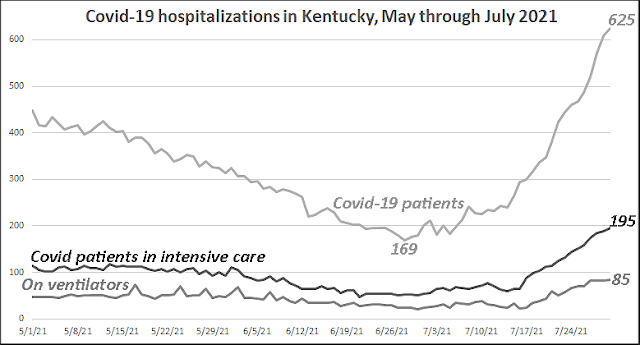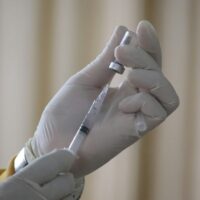When the pandemic resurged in Kentucky last month, Gov. Andy Beshear said he would base his decisions about how to deal with it partly on the number of hospitalizations, “what the outcomes are, and how sick individuals are.”
“Outcomes” mean recovery, death or something in between, such as the lingering illness known as “long Covid.” Death is a lagging indicator of the pandemic, and COVID-19 deaths in Kentucky remain low, averaging less than four per day. But there is a rising level of sickness, as measured by COVID-19 hospitalizations, intensive-care cases and mechanically ventilated patients.

On June 28, Kentucky hospitals reported 169 patients with COVID-19. On July 30, they reported 625. Hospitalizations began a steep increase on July 15, and are doubling about every 12 days.
Almost all the new admissions are people who have not been vaccinated for the coronavirus, hospitals told Deborah Yetter of the Louisville Courier Journal.
The number of COVID-19 patients in intensive care has increased likewise, from 51 on June 27 to 195 on June 30. Those on ventilators increased from 21 on June 30 to 85 a month later, a slightly faster rate.
Kristy Quinn, spokesperson for Baptist Health Madisonville, told Murray’s WKMS that the hospital is seeing more patients who need serious care.
“During the earlier surges of Covid, we saw larger numbers of inpatients at times than this, but the proportion of them in critical care was lower,” Quinn said. “To have half of them in [ICU] is significantly different from what we saw previously.”
Hospitals told Yetter and WKMS’s Dustin Wilcox that they are seeing more young people who need hospitalization for COVID-19, “which they attribute to the much higher rate of vaccination in older Kentuckians who are at the greatest risk of serious illness or death from the virus,” Yetter writes.
Hospitals say the surge makes vaccination imperative. Two major hospital operators, the University of Louisville and Med Center Health of Bowling Green, have told employees that they must be vaccinated by Sept. 1. Med Center Health, which has five Southern Kentucky hospitals, set an earlier deadline for staff in leadership positions, Aug. 9.
Baptist Health, which has seven major hospitals around the state, has a staff that is 75% vaccinated but is considering requiring vaccination, Chief Medical Officer Kenneth Anderson told Yetter.
Pikeville Medical Center CEO Donovan Blackburn told Yetter that about 60% of employees have been vaccinated.
“Of those who haven’t, some express distrust of the vaccine or possible unknown effects” she reports. “Others who are young and healthy don’t see the need.” The hospital is trying to persuade them.
“I think there’s some that are swayable,” Blackburn said. “There’s some that are dead-set against it.”





